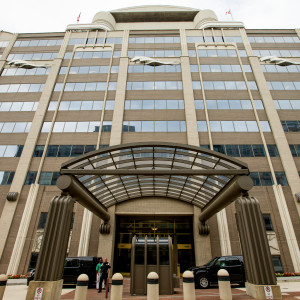The Federal Communications Commission submitted defeat Monday in its bid to let municipal internet providers compete with big broadband companies, saying the agency will not appeal a recent federal court ruling against the move.
“The FCC will not seek further review of the Sixth Circuit’s decision on municipal broadband after determining that doing so would not be the best use of commission resources,” an FCC spokesperson told multiple news outlets Monday.
Earlier this month the Sixth Circuit Court of Appeals struck down the FCC’s vote last February to override state laws in Tennessee and North Carolina, and allow municipal-run broadband networks in Chattanooga and Wilson extend outside of their jurisdictions to compete with private internet providers.
Tom Wheeler, chairman of the FCC, justified the move by citing the commission’s congressional mandate under Section 706 of the 1996 Telecommunications Act to remove consumer barriers to entry surrounding broadband and promote competition — the same authority it relied on to pass its divisive net neutrality order the same day, which has since been upheld by a federal appeals court.
The FCC didn’t fare as well at the Sixth Circuit, where judges said the FCC’s authority to promote broadband adoption, however broad, was not intended to surpass the authority of states to govern their own local governments.
“Any attempt by the federal government to interpose itself into this state–subdivision relationship therefore must come about by a clear directive from Congress, and the FCC can only pick the decision maker here if there exists a clear statement to do so in [Section] 706,” the court ruled, adding that “nowhere in [the Communications Act’s] general charge to ‘promote competition in the telecommunications market’ is a directive to do so by pre-empting a state’s allocation of powers between itself and its subdivision.”
Republicans in Congress and at the FCC made the same argument before and after the agency’s three Democratic commissioners outvoted its two Republicans last February.
“Rather than wasting its time on illegal efforts to intrude on the prerogatives of state governments, the FCC should focus on implementing a broadband deployment agenda to eliminate regulatory barriers that discourage those in the private sector from deploying and upgrading next-generation networks,” Commissioner Ajit Pai, one of the FCC’s two Republicans, said in response to the August ruling.
Wheeler and others who lined up behind the FCC’s preemption argue the laws barring municipal expansion — present in many states across the U.S. — are anticompetitive and passed at the behest of private internet providers lobbying to maintain a monopoly in areas with little competition.
“While we continue to review the decision, it appears to halt the promise of jobs, investment and opportunity that community broadband has provided in Tennessee and North Carolina.” Wheeler said following the court’s August 10 ruling. “The efforts of communities wanting better broadband should not be thwarted by the political power of those who, by protecting their monopoly, have failed to deliver acceptable service at an acceptable price.”
Larry Spiwak, a former FCC lawyer and president of the Phoenix Center, a D.C.-based think tank, said the merits of the laws are beside the point, and that the agency’s latest defeat is the result of a growing trend at the agency since Wheeler became chairman of misunderstanding or ignoring the law.
“What Wheeler steadfastly refuses to understand is that this case was not about ‘broadband statutes’ or ‘communities wanting better broadband,’ Spiwak wrote in an August op-ed. “Why? Because the issue of preemption is one of constitutional law and, as explicitly recognized by the court in [Nixon v. Missouri Municipal League], ‘the issue does not turn on the merits of municipal telecommunications services.'”
Despite the benefits of municipal broadband or the competition it could bolster, “as a matter of constitutional law, the FCC has no legal authority to preempt state laws restricting or prohibiting municipal broadband,” Spiwak added.
The former FCC attorney said the ruling came as little surprise to telecom lawyers, who predicted the outcome also likely foreseen by the Department of Justice. The DOJ refused to side with the FCC despite backing its net neutrality court case in December.
Wheeler said he’ll continue to advocate for municipal broadband competition at the request of states.
“Should states seek to repeal their anti-competitive broadband statutes, I will be happy to testify on behalf of better broadband and consumer choice,” the chairman said. “Should states seek to limit the right of people to act for better broadband, I will be happy to testify on behalf of consumer choice.”

